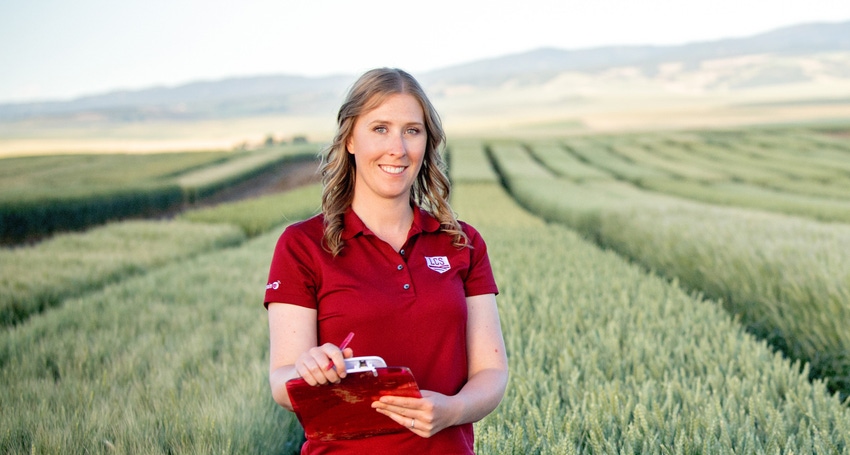
Wheat wasn’t a major crop for Hannah Kammeyer’s family farm in Estacada, Ore., while she grew up toiling in fields and working in her family’s feed store.
“We are not in a traditional wheat production area, although we did grow wheat,” Kammeyer said of her community, which is southeast of Portland. “When I was in high school wheat prices were good, but it was not a consistent crop that we had.”
Kammeyer became an expert in wheat, though, after earning a bachelor’s degree in agricultural business management at Oregon State University in 2013. She handled sales and marketing for the university’s wheat breeding program for five years before joining the marketing team at Limagrain Cereal Seeds (LCS), a major breeder, where she is now regional commercial manager for the Pacific Northwest.
She took the university breeding job to remain in agricultural communications, she said.
“I love working with farmers and the ag industry, and the job description provided a good opportunity to do that,” Kammeyer, 30, told Farm Press. “I got to learn a ton about wheat and the process of growing it. It’s a crop that I really enjoy working with now.”
The OSU sales position was the first of its kind, she said. “I got to create the position as I envisioned it to be,” she said. “We conducted our own variety trials. My responsibility was, once varieties got released, to let the industry and growers know about them – their strengths and weaknesses and how they compare to other varieties in the market.”
An early partner
At OSU, Kammeyer collaborated with researchers and local farmers, organizing field days and creating outreach materials. One of her partners was LCS, a breeder of climate-specific wheat and barley varieties. The company and university released and marketed two varieties -- Norwest Duet and Norwest Tandem.
“When we launched those products, I got to work with Limagrain … to put the products out into the market,” Kammeyer said. “Through working with them on that collaboration, I got to know their team a little better and saw how competitive they were in marketing wheat varieties … They approached me about joining the team, and here I am.”
Hired to LCS’ marketing team in the summer of 2018, Kammeyer was named regional commercial manager a year ago. She has already helped bring to market a wave of Clearfield Plus and CoAXium soft white winter wheat varieties, enabling growers to manage grassy weeds.
Once a variety is planted, she works with growers to gather and analyze the crop’s performance data.
“We’re always trying to develop the next greatest thing among the wheat varieties that are available – not only for yields but also disease tolerance, end-use quality and other variables,” she said.
Unique conditions
LCS seeks to tailor varieties to the region’s vastly diverse wheat growing conditions, as every area requires unique plant characteristics, agronomics and disease tolerance, the company explains. For instance, arid Eastern Oregon would typically benefit more from earlier-maturing varieties than would higher-rainfall areas, where growers prefer medium-maturity varieties for their winter hardiness, according to the company.
Many varieties are drought-resistant “almost by default,” Kammeyer said.
“Our trials all over Eastern Washington and Oregon are all low-rainfall sites,” she said. The lack of precipitation “puts a lot of pressure on our experimental lines, and they still perform well … As drought continues to persist, we will make selections by evolution and select varieties that are more drought-tolerant over time.”
Maximizing domestic wheat yields is crucial as the Russia-Ukraine conflict strains global supplies of the key food grain.
“Research in wheat is very important,” Kammeyer said. “It is a major crop around the world … Within the Pacific Northwest specifically on a lot of acres and farms, wheat is the only crop rotation. Being able to constantly provide them with improvements is really rewarding. The Pacific Northwest has a unique export market, so it really does play into the whole world economy.
“I really enjoy what I’ve learned about wheat,” she said. “At the end of the day, as long as I get to continue being in agriculture and feeling like I’m helping farmers and the industry feed a hungry world, that’s the end game for me.”
About the Author(s)
You May Also Like






